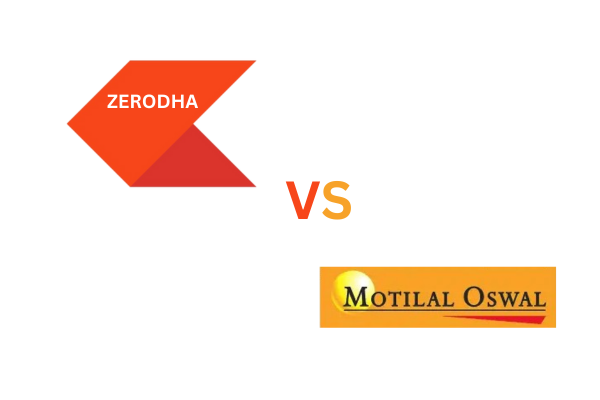Zerodha was the first app I tried when I decided to take my investments into my own hands. Back then, I was overwhelmed by complex platforms like Motilal Oswal—with their long calls, unclear charges, and intimidating dashboards. A friend recommended Zerodha, and within minutes, I was onboarded. It felt like investing was finally built for people like me—self-driven, mobile-first investors looking for control, not clutter. If you’re also looking for the best broker app for investing, you’re not alone. At Indiainvesthub.in, we help thousands of users compare platforms based on real usability—not myths.
Table of Contents
1. Flat Fee Brokerage Model
Zerodha disrupted the Indian brokerage market with its flat fee model. For equity delivery, it charges zero brokerage, and for intraday and F&O trades, it charges a flat ₹20 per order. According to NSE data, this has helped it become India’s largest retail broker by active clients as of 2025. In contrast, Motilal Oswal follows a percentage-based fee model which can be significantly costlier for frequent traders.
Features | Zerodha | Motilal Oswal |
|---|---|---|
Preview |  |  |
Established Year | 2010 | 1987 |
Brokerage App Link |
2. Superior Technology and Platforms
Zerodha’s in-house platforms like Kite (for stock trading) and Coin (for mutual funds) are industry benchmarks. Kite is lightweight, responsive, and clutter-free, offering advanced charting tools and seamless order execution. Coin allows direct mutual fund investments with zero commissions. Motilal Oswal, on the other hand, has platforms like MO Investor and MO Trader, but users often report them as slower and bulkier in comparison.
3. Educational Resources with Varsity
One of Zerodha’s standout features is Varsity, a free, structured educational platform for all levels of investors. Whether you’re learning basics or studying options strategies, Varsity makes learning accessible. Motilal Oswal also provides research and investor education, but it’s largely tailored to promoting its in-house products or advisory services.
4. Transparency in Pricing
Zerodha provides transparent brokerage calculators, detailed cost breakdowns, and live margin requirements—all without hidden fees. This builds trust among self-directed investors. Many users find Motilal Oswal’s pricing structure more opaque, with added charges for advisory, research, and DP services that can erode profits.
5. Faster Onboarding Process
Opening an account with Zerodha takes as little as 10-15 minutes if you have all the documents handy. The entire KYC process is digital. In contrast, Motilal Oswal still relies partially on physical verification or phone calls, making onboarding slower and less seamless for the mobile-first generation.
6. Better Customer Support and Community
Zerodha offers support via tickets, live chat, and an extensive Support Portal filled with guides and FAQs. Additionally, their active community on platforms like TradingQnA helps users troubleshoot real-time. Motilal Oswal also has a support team, but users have reported slower response times and less helpful automated support.
7. No Pushy Advisory or Calls
Zerodha’s business model doesn’t revolve around pushing stock tips or selling advisory services. This allows users to trade and invest independently. Motilal Oswal, being a full-service broker, often contacts clients with advisory pitches, which some may find intrusive or biased.
8. Innovative Features for Investors
Zerodha consistently rolls out features like basket orders, GTT orders, and nudge alerts that prevent impulsive investing decisions. These tech tools are designed for user benefit. While Motilal Oswal does offer good features, they tend to focus more on advisory and less on self-directed innovation.
9. Lower Overall Costs
Aside from brokerage, Zerodha also offers free direct mutual fund investing, no hidden DP charges for holding, and reduced annual maintenance charges. As per analysis by Moneycontrol and Economic Times, over a year, investors can save 20-30% more with Zerodha compared to full-service brokers like Motilal Oswal.
10. Higher Active User Base
According to NSE data from January 2025, Zerodha has over 1.2 crore active users, while Motilal Oswal has under 15 lakh. This statistic alone reflects the confidence and satisfaction levels of Indian retail investors toward the two platforms.
Why Indiainvesthub Recommends Zerodha for Self-Directed Investors
At Indiainvesthub, our goal is to empower everyday investors with the right tools, information, and platforms to make smart financial decisions. We do not promote any myths or fear-mongering, such as “portfolio washout if an app closes”. Instead, we focus on features, functionality, and cost-effectiveness. Based on our analysis, Zerodha emerges as the ideal broker app for users who value independence, affordability, and user-friendly design.
We help our readers by comparing real features that matter: order execution speed, transparency, learning tools, and cost savings. Whether you’re a beginner or a seasoned trader, choosing a platform that aligns with your needs is critical. And in 2025, Zerodha has shown time and again that it understands what Indian investors really want.
Conclusion
Zerodha, with its flat fee model, clean interface, educational content, and tech-first approach, is clearly built for the modern investor. While Motilal Oswal offers comprehensive advisory services and research reports, its traditional model, higher fees, and slower platforms may not appeal to those looking for efficiency and control.
If you’re a tech-savvy investor who prefers learning and trading independently, Zerodha might just be your best bet. Still unsure which one aligns better with your goals?
Frequently Asked Questions (FAQs)
Q1: Why is Zerodha so successful?
Zerodha is successful due to its low-cost model, tech-driven platforms, transparency, and focus on empowering self-directed retail investors.
Q2: What is a 3-in-1 account?
A 3-in-1 account links a bank, trading, and demat account for seamless investing, fund transfers, and stock transactions.
Q3: Can I have two Demat accounts?
Yes, you can have two or more Demat accounts with different brokers using the same PAN card. However, each account must be linked to a unique trading account.





